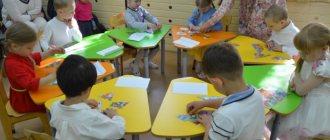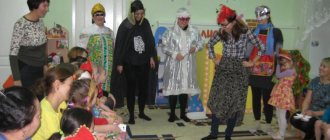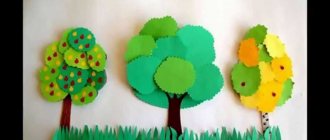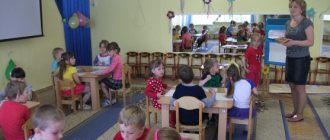Lesson on speech development in the middle group
Planning lessons should be carried out according to methodological recommendations.
Lessons on fairy tales
Lesson structure
Each lesson should be conducted according to a specific scheme:
- The organizational introductory part is characterized by a motivating and stimulating nature. The main task of the teacher at this stage is to get the children into the mood for work and awaken their interest in the topic.
- Practical part - the teacher sets the tasks and explains the essence of the task.
- Active work - children complete tasks in conjunction with a verbal assessment of the students’ activities.
- Summing up - the teacher’s goal is to draw children’s attention to the result.
What to do if a child speaks poorly at 4 years old
GCD for speech development in the middle group according to the Federal State Educational Standard
The main task of a kindergarten teacher is to teach children to answer the questions posed. Initially, an analysis is carried out by the teacher, an appropriate task is selected, and familiarization with the material occurs.
How does speech develop in the middle group according to the Federal State Educational Standard?
ECD for the development of coherent speech in the middle group helps to enrich knowledge about the life of wild animals. When attending kindergarten, already in the fourth year, children should know how animals behave when autumn, winter, spring or summer comes. The purpose of the lesson is, first of all, the formation of cognitive interest in nature, the awakening of a sensory attitude to the beauty of autumn nature.
Note! The teacher fosters a caring attitude and love for the animal and plant world.
Formation of sound culture of speech
A lesson in sound speech is an integral part of general speech culture. Such a software package covers all aspects of the sound design of words or spoken speech:
- correct pronunciation of sounds,
- correct pronunciation of words,
- volume and speed of speech utterance,
- rhythm,
- logical stress,
- normal functioning of the speech-motor apparatus,
- the presence of a complete speech environment.
Particular attention should be paid to the possibility of using music classes in work on the sound culture of speech. This work should be carried out in coordination between the teacher and the music worker, since individual elements of a musical lesson (listening to music, singing, musical-rhythmic movements) develop children’s speech hearing, speech breathing, voice, diction, tempo, rhythm and intonation expressiveness of speech.
Work on intonation expressiveness and emotionality of speech
Planning the development of intonation expressiveness of speech is one of the most important tasks of speech therapy work with preschoolers who have general speech underdevelopment. Normally, children master intonation expressiveness of speech mainly by the age of five. As a rule, this happens naturally in the process of communicating with adults. The family and kindergarten teacher should have a special influence.
Intonation expressiveness and emotionality of speech
Note! Insufficient intonation expressiveness in children of older preschool age with ODD can affect the quality of transmitted information, thereby creating difficulties in mutual understanding and limiting the communicative capabilities of children.
Learning to perceive poetic speech
A developed child can express an interest in fiction from early childhood. With the right approach, every parent can reveal their child's talents at an early stage. Therefore you need to do the following:
- pay attention to expressive means (figurative words, expressions, epithets, comparisons);
- show sensitivity to the poetic word;
- see the main differences between literary genres: fairy tale, story, poem.
Tasks for speech development in the middle group according to the Federal State Educational Standard
Main tasks for the development of speech activity:
- Learn to compose a story based on a picture using a model using dialogic speech;
- Learn to write descriptive stories about vegetables or fruits;
- Exercise in the classification of vegetables and fruits, the formation of diminutive forms of nouns;
- Form ethical standards of behavior: a friendly attitude towards each other in everyday life, during the game;
- Develop attention, thinking, memory, imagination, grammatical structure of speech, tactile sensitivity, intonation side of speech, coherent speech;
- Enrich vocabulary;
- Implement an individually differentiated approach;
- Cultivate respect for people and a friendly attitude in games and in classes.
What tasks do teachers set for speech development in the middle group according to the Federal State Educational Standard?
Speech development in the middle group of preschool educational institutions
The development of communication and speech skills, which includes enriching vocabulary and developing clear pronunciation, is considered one of the main tasks for preschoolers.
Speech development lesson
Note! For the correct speech development of children in the middle group, educators do a tremendous amount of work. It is based on a set of special exercises and methodological techniques aimed at improving speech skills and developing a high culture and politeness of speech.
To develop speech in the middle group of preschool educational institutions, various directions are used:
- children’s knowledge and ideas about surrounding objects deepen;
- children become familiar with the details and names of parts of things;
- words denoting the properties of objects and phenomena are studied;
- vocabulary in the field of professions is replenished;
- words that denote relationships between people are studied;
- children learn to express their own thoughts in complex sentences that are grammatically correct.
To solve the assigned tasks in the middle group, the teacher must take a responsible approach to the process and purposefully conduct classes.
Federal State Educational Standards requirements for speech development
All educational institutions, regardless of whether they are public or private, must focus on certain program requirements that are specified in the Federal State Educational Standard.
As for the speech development of preschoolers, the requirements are as follows:
- Vocabulary must be constantly enriched;
- the child must have speech skills in accordance with age;
- the sound and intonation range of speech expressiveness should expand;
- develop the ability to perceive sounds by ear and at the same time hear, identify and, if there are errors, correct them;
- develop the ability to listen and remember the storyline;
- develop logically consistent and meaningful speech;
- skills of retelling and acting out dialogues;
- the child must learn to convey the meaning emotionally and read a poem by heart with expressiveness;
- work should be carried out to expand the horizons of preschoolers about objects, properties, phenomena and the concept of a coordinate system;
- generalizing concepts are introduced into the lexicon;
- training is provided to improve the grammatical construction of sentences.
Note! All training sessions should be conducted by the teacher so that they simultaneously include solving assigned problems and game moments. Only in this case will it be possible to interest children and achieve the desired results.
Directions of speech development (FSES DO)
Age-related psychological characteristics of children in the middle group of preschool educational institutions
In terms of development, middle preschool age is a continuation of early childhood. During this period, children master the world of permanent things, master the culture of speech, and the formation and development of psychological perception also occurs.
In middle age, children continue to actively develop speech, substitution ability, thinking and imagination. With the help of speech, middle group students express their emotions and share their impressions.
Note! There is a rapid development of memorizing information and retaining it in memory, and the ability to concentrate is also enhanced.
As a rule, at this age, kindergarten teachers conduct special planned classes on speech development. They are provided for by special educational standards. But, despite this, pedagogical work in this direction is not limited to a certain framework. The most important thing is that when selecting tools, the teacher must take into account all the age characteristics of his students.
Speech development program for preschoolers according to O. S. Ushakova.
Methodological tools
Within the framework of the requirements of speech development, the teacher faces serious tasks that force him to approach the process thoughtfully, responsibly and in accordance with certain standards.
Basic pedagogical techniques
Each lesson on speech development in the middle group should be based on a specific pedagogical technique. Currently, three main groups of speech development techniques in preschool institutions have been identified. These are verbal, visual and playful techniques.
Their essence is as follows:
- Teaching stories using story pictures.
- Daily reading of fiction, which is provided for in the educational program.
- Carrying out work with children in a conversation format.
- Application of gaming technologies.
- Systematic and unobtrusive repetition of a new word.
- Motivation to complete the curriculum.
Note! In addition to implementing the pedagogical techniques listed above, the teacher must organize physical education sessions for students. They are also part of the curriculum and help to develop a serious attitude towards physical education in children.
Games for speech development
By the age of five, children should learn to pronounce all sounds correctly. You can achieve your goal through daily breathing exercises.
Didactic games on “Speech Development”
You can form grammatically correct speech thanks to games and exercises:
- "More less".
- “Call me kindly.”
- “Whose toy?”
- “Continue the sentence.”
- "Which".
Speech corner equipment
In order to stimulate independence and informal playful communication with children, in accordance with the requirements of the Federal State Educational Standard, an aesthetically attractive, comfortable and special subject-development environment must be created in which children will not be afraid, but rather feel at ease and at ease.
Important! It is best to place the speech corner away from the playing area in a well-lit place. It must be equipped with didactic and visual aids, as well as the necessary materials that are used by the teacher during classes.
Speech corner
Table: filling out the speech corner by section
| Chapter | Content |
| Certificate | Schemes of words, sentences and corresponding games (“Add a word”, “Choose a word”), puzzles and crosswords. |
| Connected speech | Subject pictures, “Playing in the profession”, “Guess by the description”. |
| Grammar | Games “Name it affectionately”, “One-many”. |
| Vocabulary | Pictures, lotto, puzzles. |
| Sound pronunciation | Game exercises, games to automate sounds. |
| Breath | Pipes, bubbles, balloons for inflation. |
| Fine motor skills | Pencils, puzzles, mosaics, tops. |
| Phonetic hearing | Sound differentiation games. |
| Articulation gymnastics | Pictures, sets of exercises, methodological literature. |
| Higher mental functions | Dominoes, cut pictures. |
Note! Among other things, experts recommend having Ushakova’s book “Speech Development” in the speech corner. It examines in detail all the problems of speech development for children in the middle group, selects methodological recommendations and compiles lesson notes.







